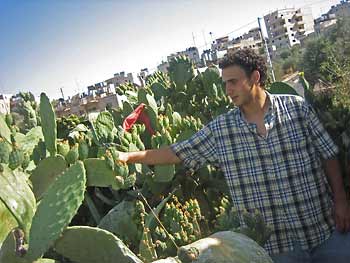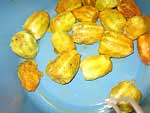BETHLEHEM - A few days ago, I visited a family with five members — a very overweight father, a physically fit mother, two young boys and one young girl. They told me that the father was recently diagnosed with diabetes, and the mother and children also had very high readings. I asked them about any advice given to them by their doctor regarding further care, medication and dietary adjustments. Their doctor did not really tell them very much, and they did not know what types of diabetes they had and what to do next. I explained to them how it is critical that they find out specifically if their children have juvenile diabetes, as it seemed that they might from their high readings and the presence of diabetes in their family. I spent quite a bit of time trying to convince them to eliminate harmful foods from their diet, and to care for their bodies. I noticed that the father's feet were discolored and had cuts that did not seem to be healing. I also explained the importance of the glucose monitoring systems.
  Daniel picks cactus fruits in Beit Jala near Jerusalem, reaping a harvest of delicious yellow fruit (right, after peeling) and a handful of painful thorns, despite his best efforts. (Daniel Zoughbie photos) Daniel picks cactus fruits in Beit Jala near Jerusalem, reaping a harvest of delicious yellow fruit (right, after peeling) and a handful of painful thorns, despite his best efforts. (Daniel Zoughbie photos) |
Yesterday, I went with my friends to pick cactus fruits. They are usually green or red fruits growing on cactus plants. The delicious fruit is found inside a tough thorny skin and is well worth the hassle necessary to pick them — well, almost. It was a sweltering day when we came to Beit Jala, a town near Bethlehem. I walked carefully up to the cactus plants with my friend, who showed me how to avoid the thorns from the plants and grab the fruit with a piece of cardboard. This was all well and good, and I picked some fruit, but he failed to tell me that sometimes the wind blows thorns on you. The thorns are not large, but are very tiny slivers that can be dangerous if they get in your eye. On the way home, my hands started to hurt and itch, and after closer examination, I realized that I had thorns all over them. I tried to pull them out by my fingernails, but this only irritated my hands and broke off the slivers in my skin. When I came home, I found out that there is a method of removing the slivers. I wet my hands and then dumped salt in them before rubbing them together vigorously. It did the trick. After that, my friends wanted help peeling the cactus, asking with grins on their faces, and I graciously passed up the opportunity to get more thorns in my hands.
I was finishing up some work for the Micro-Clinic Project today and was going to take a taxi home but instead decided to walk — about 30 minutes back to my house. I stopped on the way to buy some shawerma and humos, and hurried home to eat it while it was still hot. I arrived home, put the food on the counter and started to turn on the computer when some friends called me to come and sit with them and drink tea on the veranda facing the street. All of a sudden, I started to hear loud explosions, followed by young boys proclaiming that soldiers were coming, followed by a parade of armored IDF (Israeli Defense Force) jeeps passing by the house. I had my camera with me, but those I was with advised me not to take it out in front of the soldiers, as they do not like photos. One jeep stopped in front of us while the others continued around the corner, where little boys followed throwing stones. By this time, everyone in Bethlehem was on their roofs or at their windows watching the action unfold. It was particularly sad for me to see people so desensitized, especially the young boys, so that when soldiers come, they run into the streets while their parents scream at them to stay inside. It would appear that this routine has become a form of excitement and almost like a morbid cat and mouse game between the boys and the soldiers. I watched this in greater detail later that night on the local news, as the little boys threw stones and then ran as tear gas was thrown at them.
Two American friends came to the house a little shaken up. One of them was on the road when they met the IDF soldiers head on and subsequently backed up and came another way. The other was a Texan woman who was coming back walking from Beit Sahour and was almost caught in the middle of the stone throwing. I was happy that I had decided to come home a little bit earlier than expected — especially since I was walking home. When the soldiers passed by the house, the Palestinian friends I was sitting with did not move, even as deafening explosions, caused by rockets and percussion bombs, were shaking the ground. The past incursions in Bethlehem were mild in comparison to this one, but they did not seem concerned. I wanted to capture a picture and tried to do so as a jeep went back up the street, but all of a sudden the back doors of the jeep opened as I was trying to shoot the picture. I froze before realizing that they had only forgotten to lock the doors; I did not get the picture, however. I stayed outside with my friends until I looked above my head and saw a tear gas canister flying through the air. Smelling something terrible, I hurried inside their house with their son, but they stayed outside, and later I heard from them that they could not breathe from the gas. I watched from an enclosed roof as the jeeps continued to pass by beneath the house while others surrounded a house not far from where I live. As explosions continued in various degrees of magnitude and rapid gunfire resonated, I watched as ambulances rushed to the scene, and a crowd of spectators continued to run to and from the action. The gunfire and explosions continued heavily for about three hours and, until 11 p.m., occasional explosions or gunfire continued. Then, perhaps to offset the shootings and explosions, prayers started to be continuously proclaimed over the loudspeakers of the local mosque, and there were two outside weddings in another part of the city that had their own music. So, the whole evening I heard prayers, wedding parties, shootings and explosions!
I started to watch the news coverage of the incursion. It described the types of rockets and weapons used, and the houses and names of people inside the selected houses; in this case the IDF was looking for members of Islamic Jihad. For me, this experience was a bit exciting, yet very frightening for a number of reasons. First, it is taking a little bit of time for me to get accustomed to heavily armed jeeps waiting in front of my house, rockets exploding and tear gas flying over my head. Just a few months ago, I bought an iced tea at Café Strada in Berkeley, walked across the street and sat on the bench in the peaceful surroundings of a fountain, grass and trees. It is sometimes hard for me to grasp the fact that people have to live like this in the West Bank on a continual basis and have come to accept these conditions, while I am sipping my iced tea in Berkeley. Secondly, this experience was frightening because I knew some people, not just my American friends, who were caught in traffic where the shootings were happening. Thankfully, they arrived safely, but it is a very scary feeling to know that people you care about are in danger. And thirdly, this experience was frightening because everyone I spoke with told me that this is nothing compared to what they have had to deal with in the past. I listened as a 13- year-old boy excitedly pointed to a neighbor's house telling me, "Wow! They sent rockets to the house!" … and "Wow! Me and my cousins, we hid in the bathroom, and it was Woooow! So loud!" Then, his mom interrupted and told me how they had lived like this, with tanks in the streets below, under curfew for 40 days! During one of these curfews, her niece needed to be rushed to the hospital to deliver a baby. Her husband and brother-in-law took her, despite the curfew, and thankfully were not hurt.
Today was a sad reminder of my first trip to Palestine — during the First Intifada — where I remember, among many similar things, the little boys throwing stones. On the one hand, I have seen a great change in the civil society here in Palestine, including the recent elections, but I sincerely hope that these positive steps will not be compromised by the negative ones I saw today. I believe that there is a window of opportunity at this point that has opened for the first time in the Israeli-Palestinian conflict, and to let that opportunity close would be a terrible mistake.




